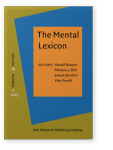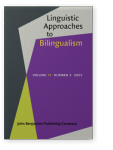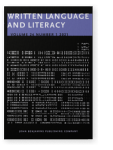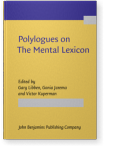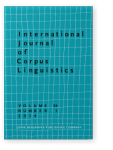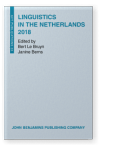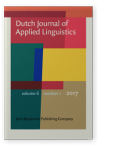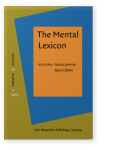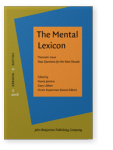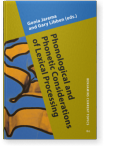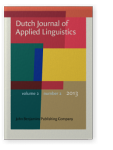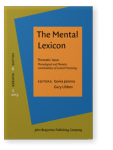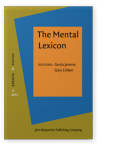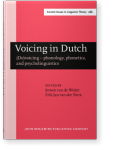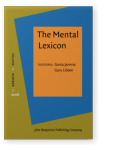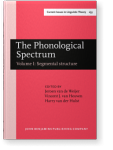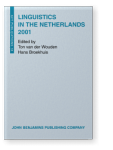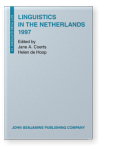Mirjam Ernestus
List of John Benjamins publications for which Mirjam Ernestus plays a role.
Journal
2023 How explicit instruction improves phonological awareness and perception of L2 sound contrasts in younger and older adults Linguistic Approaches to Bilingualism 13:3, pp. 372–408 | Article
Despite the importance of conscious awareness in second language acquisition theories, little is known about how L2 speech perception can be improved by explicit phonetic instruction. This study examined the relationship between phonological awareness and perception in Dutch younger and older… read more
2023 Second language learners acquire reduced word forms just like they acquire full forms: From exposure Linguistic Approaches to Bilingualism: Online-First Articles | Article
We investigated the effect of auditory exposure on the recognition of full (i.e., canonical) and reduced (i.e., with weakened or deleted sounds) word forms by beginner second language (L2) learners. We taught three participant groups the same French schwa words. One group was trained only on the… read more
2021 The role of grammar in spelling homophonous regular verbs Written Language & Literacy 24:1, pp. 38–80 | Article
Can a lack of grammatical knowledge alone be held accountable for the spelling errors that are made for homophonous verb forms and do these errors occur because spellers do not apply their grammatical knowledge? Three experiments with secondary school pupils were conducted on Dutch weak prefix… read more
2021 Chapter 4. Why we need to investigate casual speech to truly understand language production, processing and the mental lexicon Polylogues on The Mental Lexicon: An exploration of fundamental issues and directions, Libben, Gary, Gonia Jarema and Victor Kuperman (eds.), pp. 77–108 | Chapter
2019 Do speech registers differ in the predictability of words? International Journal of Corpus Linguistics 24:1, pp. 98–130 | Article
Previous research has demonstrated that language use can vary depending on the context of situation. The present paper extends this finding by comparing word predictability differences between 14 speech registers ranging from highly informal conversations to read-aloud books. We trained 14… read more
2018 The Dutch verb-spelling paradox in social media: A corpus study Linguistics in the Netherlands 2018, Le Bruyn, Bert and Janine Berns (eds.), pp. 111–124 | Article
Although the Dutch verb spelling system seems very straightforward, many spelling errors are made, both by children and adults (e.g., Sandra, Frisson, & Daems 2004). These errors mainly occur with verbs with two or more homophonous forms in their inflectional paradigms. Ample experimental… read more
2017 Advanced second language learners experience difficulties processing reduced word pronunciation variants Dutch Journal of Applied Linguistics 6:1, pp. 1–20 | Article
Words are often pronounced with fewer segments in casual conversations than in formal speech. Previous research has shown that foreign language learners and beginning second language learners experience problems processing reduced speech. We examined whether this also holds for advanced second… read more
2017 The traces that novel morphologically complex words leave in memory are abstract in nature The Mental Lexicon 12:2, pp. 181–218 | Article
Previous work has shown that novel morphologically complex words (henceforth neologisms) leave traces in memory after just one encounter. This study addressed the question whether these traces are abstract in nature or exemplars. In three experiments, neologisms were either primed by themselves… read more
2016 Why we need to investigate casual speech to truly understand language production, processing and the mental lexicon New Questions for the Next Decade, Jarema, Gonia, Gary Libben and Victor Kuperman (eds.), pp. 375–400 | Article
The majority of studies addressing psycholinguistic questions focus on speech produced and processed in a careful, laboratory speech style. This ‘careful’ speech is very different from the speech that listeners encounter in casual conversations. This article argues that research on casual speech… read more
2015 How robust are exemplar effects in word comprehension? Phonological and Phonetic Considerations of Lexical Processing, Jarema, Gonia and Gary Libben (eds.), pp. 15–40 | Article
This paper studies the robustness of exemplar effects in word comprehension by means of four long-term priming experiments with lexical decision tasks in Dutch. A prime and target represented the same word type and were presented with the same or different degree of reduction. In Experiment 1,… read more
2013 Zij surfde, maar hij durfte niet: De spellingproblematiek van de zwakke verleden tijd in Nederland en Vlaanderen Dutch Journal of Applied Linguistics 2:2, pp. 133–151 | Article
Hoewel de spelling van Nederlandse verledentijdsvormen van zwakke werkwoorden algemeen als eenvoudig wordt beschouwd (ze zijn immers klankzuiver) maken zelfs universiteitsstudenten opvallend veel fouten bij de keuze tussen de uitgangen -te en -de. Voor een deel zijn die fouten ‘natuurlijk’ in die… read more
2013 How robust are exemplar effects in word comprehension? Phonological and Phonetic considerations of Lexical Processing, pp. 269–294 | Article
This paper studies the robustness of exemplar effects in word comprehension by means of four long-term priming experiments with lexical decision tasks in Dutch. A prime and target represented the same word type and were presented with the same or different degree of reduction. In Experiment 1,… read more
2011 The lifespan of lexical traces for novel morphologically complex words The Mental Lexicon 6:3, pp. 374–392 | Article
This study investigates the lifespans of lexical traces for novel morphologically complex words. In two visual lexical decision experiments, a neologism was either primed by itself or by its stem. The target occurred 40 trials after the prime (Experiments 1 & 2), after a 12 hour delay (Experiment… read more
2007 6. Intraparadigmatic effects on the perception of voice Voicing in Dutch: (De)voicing – phonology, phonetics, and psycholinguistics, Weijer, Jeroen van de and Erik Jan van der Torre (eds.), pp. 153–174 | Article
In Dutch, all morpheme-final obstruents are voiceless in word-final position. As a consequence, the distinction between obstruents that are voiced before vowel-initial suffixes and those that are always voiceless is neutralized. This study adds to the existing evidence that the neutralization is… read more
2006 Dynamics of the auditory comprehension of prefixed words: Cohort entropies and Conditional Root Uniqueness Points The Mental Lexicon 1:1, pp. 125–146 | Article
This auditory lexical decision study shows that cohort entropies, conditional root uniqueness points, and morphological family size all contribute to the dynamics of the auditory comprehension of prefixed words. Three entropy measures calculated for different positions in the stem of Dutch… read more
2003 The role of phonology and phonetics in Dutch voice assimilation The Phonological Spectrum: Volume I: Segmental structure, Weijer, Jeroen van de, Vincent J. van Heuven and Harry van der Hulst (eds.), pp. 119–144 | Article
2001 Choosing between the Dutch past-tense suffixes -te and -de Linguistics in the Netherlands 2001, Wouden, Ton van der and Hans Broekhuis (eds.), pp. 77–88 | Article
1997 The Voicedness of Intervocalic Word-Final Stops in Dutch Linguistics in the Netherlands 1997, Coerts, Jane A. and Helen de Hoop (eds.), pp. 73–84 | Article
